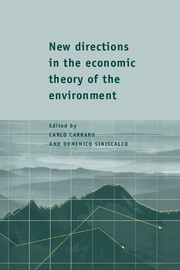Book contents
- Frontmatter
- Contents
- List of contributors
- 1 Theoretical frontiers of environmental economics
- 2 Growth with natural and environmental resources
- 3 Environmental policy and technological innovation
- 4 Environmental policy, distortionary labour taxation and employment: pollution taxes and the double dividend
- 5 International coordination of environmental taxes
- 6 Environmental policy and international trade
- 7 Environmental regulation and international capital allocation
- 8 Towards a theory of international environmental cooperation
- 9 Group formation in games without spillovers
- 10 Non-cooperative models of coalition formation in games with spillovers
- Index
7 - Environmental regulation and international capital allocation
Published online by Cambridge University Press: 11 January 2010
- Frontmatter
- Contents
- List of contributors
- 1 Theoretical frontiers of environmental economics
- 2 Growth with natural and environmental resources
- 3 Environmental policy and technological innovation
- 4 Environmental policy, distortionary labour taxation and employment: pollution taxes and the double dividend
- 5 International coordination of environmental taxes
- 6 Environmental policy and international trade
- 7 Environmental regulation and international capital allocation
- 8 Towards a theory of international environmental cooperation
- 9 Group formation in games without spillovers
- 10 Non-cooperative models of coalition formation in games with spillovers
- Index
Summary
What are the issues?
In economic theory, free international trade in goods and factors is seen as a source of wealth and welfare gains. Restrictions on trade and factor movements prevent the factors of production from moving to the locations of their most efficient utilisation and are, therefore, in general undesirable. The exceptions to this rule are based either on second-best arguments (the infant industry argument) or on strategic considerations that lead to Prisoner's Dilemma situations (the optimum tariff and strategic trade policy). Moreover, the stylised facts of post-war economic history suggest that outward-oriented development strategies employed, e.g., by East Asian countries have been much more successful than import substitution and the striving for self-reliance that were the philosophies of development in many Latin American countries and the Council of Mutual Economic Aid. On the background of this historical experience and of the theoretical work of the last decades, most economists now accept the general validity of the free-trade principle, at least as a good rule of thumb (Krugman (1987)). This view has come under attack again, now by environmentalists.
There are several reasons for environmentalists to be sceptical about free trade and unrestricted factor movements. Free trade has specialisation effects and inevitably some countries will specialise in the production of pollution-intensive goods. This will increase environmental disruption in these countries and, if there is transfrontier pollution, also elsewhere. The second problem is that of capital mobility and foreign direct investment. Owners of capital are looking for the most profitable investment opportunities. Since high levels of environmental regulation raise production costs, capital will, ceteris paribus, move to the country with the lowest pollution abatement requirements.
- Type
- Chapter
- Information
- New Directions in the Economic Theory of the Environment , pp. 193 - 238Publisher: Cambridge University PressPrint publication year: 1997
- 3
- Cited by

